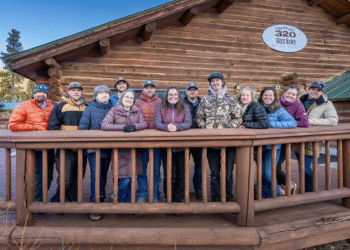EBS STAFF
BIG SKY – From an outside perspective, no one would blame the members of the Big Sky Resort Area District tax board if they decided to hang up their boots for a stretch, relishing in a year marked by measurable progress.
Those landmarks are certainly worth celebrating: most recently, they ushered in a new resort tax ordinance that will, for the foreseeable future, dictate consumer and vendor taxes with a clarity that escaped previous ordinances; seeing through a Logan Simpson-commissioned community survey that will potentially dictate the spending of hundreds of millions of dollars in Big Sky over the next decade; successfully lobbying and following through on the passing of SB 241 in the 2019 Legislative Session, allowing for an incremental 1 percent resort tax levy for the purpose of infrastructure; and judiciously distributing just shy of $8.5 million in collections between nearly $11.5 million in appropriation requests, to name a few.
At the BSRAD’s Nov. 13 open board meeting, the idea of complacency in the wake of domino successes came crashing down as it pertains to Ordinance 98-01 and the Logan Simpson Our Big Sky Community Visioning Strategy in particular. Some might argue the legwork for the latter hasn’t even reached a halfway mark.
“We solicited the community to tell us what [community] priorities were, we heard from them, now the real work begins,” said BSRAD District Manager Daniel Bierschwale.
Rolling out measures of compliance and accountability, specifically, dominated the Nov. 13 discussion—as the saying goes, and quite appropriate for a town located in the mountains of Montana, “you can lead a horse to water, but you can’t make him drink.”
Ensuring compliance for the ordinance appears a more approachable hurdle, especially now that the steps behind the “Three R’s,” Rules, Regulations and Registrations, have become crystal clear.
Still, as of the meeting, only 50-60 Big Sky businesses out of an estimated 1,000 had registered via the new online registration portal, although the ordinance does not go into effect until Nov. 25.

More daunting, however, is ensuring the Our Big Sky Community Visioning Strategy isn’t shelved in the BSRAD archives, but instead sees to “continuing the momentum created through the process, including increased community engagement,” Bierschwale said.
“I feel an obligation,” said BSRAD Chairperson Kevin Germain. “We funded this report and if it goes nowhere then shame on us. I’m hoping that we do something to help this report move forward.”
Present at the meeting was BSRAD outside counsel Kimberly Beatty, who pointed out BSRAD has no jurisdiction in the form of governance.
“I am concerned that the resort tax district is not the appropriate body to be discussing governance issues in the community, or how to implement this plan. The role of the resort tax is specific, it is funding … you were not given the approval to act as a city council or government,” Beatty said. “Your role is to fund projects and you can use this document to help guide how you’re going to fund, what you’re going to fund, and the priority you’re putting on projects.”
Beatty noted the issue of governance is something community leaders need to figure out, and is not the district’s sole responsibility.
“Clearly we have a void in this community that needs to be filled,” said Vice Chair Steve Johnson. “The only point I’d make is that in exercising our defined mission, we have to allocate funding with some plausible means of accountability for delivering the results that are sought [in the Community Visioning Strategy] … That ain’t governance, but we do have a responsibility to see that it’s done in a credible fashion. Certainly for the large things being asked for in this report.”
Other notable items included a discussion of costs and options for the tentative BSRAD office remodel as well as discussion on a working first-ever draft of bylaws, especially where a potential option for proxy voting is concerned—currently, a member of the board must be present in order to cast a vote.
“The bylaws is one of the governing documents that will help put into place the foundations for a strong organization to grow and support community needs, now and in the future,” Bierschwale said.
The board’s newest elected member, Ciara Wolfe, CEO of the Big Sky Community Organization, warned against abusing the potential allowance of proxy voting.
“I think we need to set very clear expectations about attendance for the board,” Wolfe said. “[With proxies] then it’s very easy to sit on this board and write in your vote and not have to be in front of the public expressing your view … I think there’s so much more value to being here.”
The topic was tabled for a future open board meeting.














